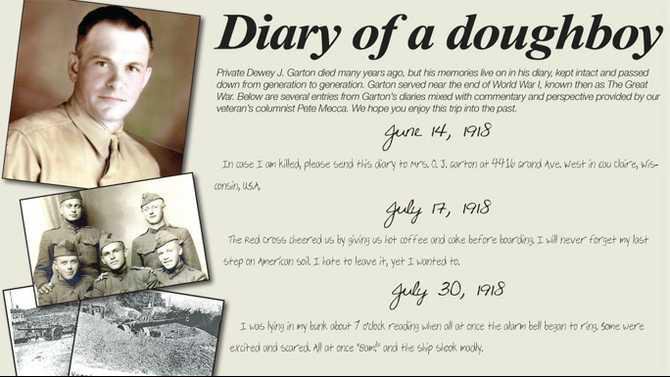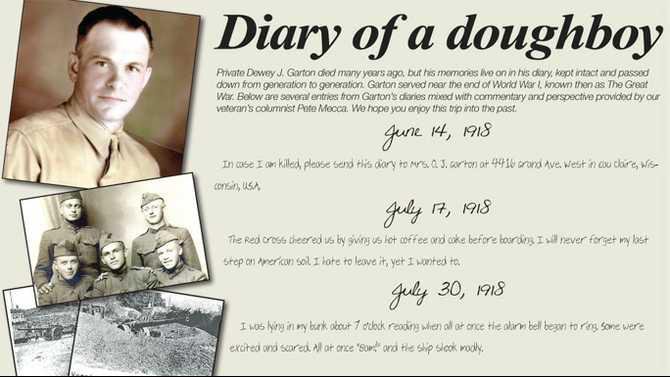Casualties of that magnitude seen in World War I are totally unacceptable in today's world, yet the same horrible degree of killing was customary and, sadly, predictable during The Great War. Of the 65 million military participants, 10 million would perish in the first major military conflict of 20th century.
This is the diary of World War I veteran Private Dewey J. Garton, Battery "F" 61st ARB C.A.C. (Field Artillery). His entries start on June 14, 1918 and end upon his safe separation from service on Feb 25, 1919.
July 11, 1918 - "We went into quarantine," Garton said. After leaving Camp Eustis, the men march to a small stream where they are carried across by motorboats. Once on dry land, the men march through Newport News, Va. to Camp Stuart.
July 17, 1918 - Following their six day quarantine, the men march back to Newport News to board a ship for France. "The Red Cross cheered us by giving us hot coffee and cake before boarding. I will never forget my last step on American soil. I hate to leave it, yet I wanted to."
July 18, 1918 - 10 a.m.: The convoy sails with an escort of two torpedo boats and one cruiser. "...finally into the Great Atlantic. Oh my! What a feeling or sensation. The big ship sailed along so smooth and fast."
July 20, 1918 - The balance of the convoy gathers near Hobopin, N.H. and sails for France. "...the sea was somewhat rough. The big ship would rock and roll. It was a lot of fun, if a fellow could stand it. We sailed away together, almost 20,000 strong."
July 30, 1918 - The convoy is bushwhacked by German submarines. "I was lying in my bunk about 7 o'clock reading when all at once the alarm bell began to ring. Some were excited and scared. All at once "Bam!" and the ship shook madly... I thought a torpedo had hit us but it proved to be one of our six inch deck guns shooting at a sub close by."
Topside, Garton watched the sea battle as escorting destroyers engaged two submarines. The destroyers chased the subs away, with a possible sinking of one. "We were as calm as could be and laughing and talking. We sailed into port at 8 O'Clock that night... people ashore waved handkerchiefs and hands at us. The French people seemed comical... Their talk was more so. I think I will like France just fine."
Aug. 7, 1918 - Garton boards a train near St. Nagier. "It was very crowded and uncomfortable. That night I slept on a plank a foot wide and certainly did not like it."
Aug. 8, 1918 - "I never suffered so in all my life as I did last night trying to sleep! I prayed for morning to come."
Aug. 15, 1918 - "...took a long hike with gas masks on. Went several miles with no stopping. We were nearly exhausted."
Note: Throughout the diary, Garton makes references to his gas mask. Chemical warfare in World War I was deadly and painful. The Germans started the madness on April 22, 1915 by firing in excess of 150 tons of Chlorine gas on French troops in Ypres, Belgium on April 22, 1915. The Allies, including America, soon followed suit. Agents included tear gas, mustard gas, phosgene, chlorine and many more that caused swelling of the eyes, nose, armpit and any soft-skin area. Blindness, massive blisters, severe headaches and pneumonia caused by blisters on soldiers' lungs hospitalized tens of thousands. Thousands more died a horrible death.
Sept. 26, 1918 - "Went to old grave site now being dug up... lots of skeletons and bones. Found hair combs and hair, too. It certainly was gruesome."
Oct. 2, 1918 - "Went through tear gas chamber. Took our masks off in room. Gas attacked my eyes... made tears run and pained extremely."
Rain, cold, mud, disease, firing artillery, and, yes, American football and baseball in the rear area between the killing times were common.
Oct. 21, 1918 - "...gas instruction by Lt. Gee in the gun pits. I certainly do not want to be gassed."
Oct. 23, 1918 - "Tractors returned the 61st guns to Libourne early this morning. The names of our 4 big guns belonging to Battery F are: ‘Black Jack,' Weeping William,' ‘U.B. Damn,' and ‘Big Ben.' We are also using the French 75's."
Oct. 28, 1918 - "...the 61st Artillery is moving to Troyes. It is a city lately inhabited by Germans. It has now been captured by the Americans."
Oct. 3, 1918 - "Good war news. The Kaiser has abdicated. Austria is begging for peace and Turkey is solely in the power of the allies. Wrote a letter to Calla. I sure wish I was with her now."
Nov. 11, 1918 - The Great War is over. "Today will be a memorial day in the history of the world. We joined the main battery with gas masks, helmets, rifles, and side arms, just in case. The Kaiser has fled to Holland in a powerful motor car. The King and Queen of Bavaria have fled from the throne. The Crown Prince of Germany signed away all rights to the throne. The German fleet refused to act. The sailors hoisted Red Days of Revolution. The officers were shot and killed. In many cities the revolution has broken out."
As The Great War ended and the guns fell silent, seeds were sown worldwide to almost guarantee future wars.
Communists came to power in Russia, the Pacific power of Japan was ensured, Britain's colonial rule faltered, the now paranoid French wasted millions building the useless Maginot Line to defend its borders and a disillusioned Austrian corporal in the German army, Adolf Hitler, vowed to one day attain revenge for his country's humiliation.
Jan. 30, 1919 - Coming home. "We steamed out of Marseilles at 5 p.m. I ate supper and went to bed. I slept real good."
Feb. 25, 1919 - The last entry: "The boys left Camp Upton at 8 a.m. It was a sad separation."
Garton also served in World War II teaching gunnery in Texas. When asked why the 44-year-old sergeant was again in uniform, he said, "I was drafted."
My deepest appreciation to Mrs. Kim Johnson for entrusting me with her grandfather's World War I diary.
Pete Mecca is a Vietnam veteran, columnist and free-lance writer. Contact Pete at aveteransstory@gmail.com or visit his website, aveteransstory.us




